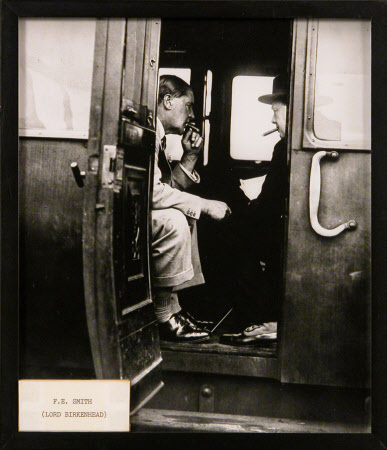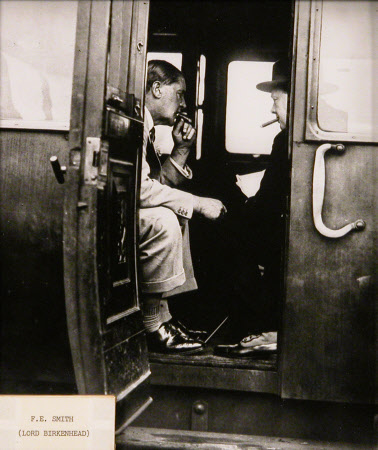Lord Birkenhead
Caption
While only a sliver of his profile is visible through the door of this train carriage, the future prime minister Winston Churchill (1874– 1965) is instantly recognisable. Cigar in mouth, hat on head, he is sitting opposite Frederick Edwin Smith, 1st Earl of Birkenhead (1872–1930), usually referred to by those who knew him as ‘F.E.’. Their close friendship blossomed from their earliest acquaintance. ‘From that hour’, Churchill recalled, ‘our friendship was perfect’. Whether this was a pre-arranged press opportunity or a spontaneous encounter, the photographer cleverly uses the open doorway of the carriage to frame this shot as an exclusive peek into the lives of two eminent figures engaged in important conversation. Though not always politically aligned, the two men shared vigour, sharp wit, excellent oratorical skills and deep mutual respect. In 1930, not long after this photograph was taken, Smith died of pneumonia caused by cirrhosis of the liver. Churchill made a toast at ‘The Other Club’, which he and Smith had set up together in 1911: ‘Let us drink tonight in silence … to the memory of a dear and honoured friend whose like we shall never see again’. When Churchill himself died aged 90 in 1965, preparations were made for his beloved family home Chartwell to open to the public. His widow Lady Churchill (1885–1977) helped to choose and acquire several photographs to convey important events and acquaintances in her late husband’s life, including this one. Although the photograph had not been owned by the statesman himself, the value placed on his friendship with ‘F.E.’ is reflected in its selection by the Churchill family for public display.
Summary
Photograph of Lord Birkenhead (facsimile on Back Stairs C4 )
Provenance
Lord Birkenhead otherwise known as F.E. Smith first became a Conservative MP after winning a seat for Walton in 1903. A few months after his first speech as an MP, he was introduced to Winston Churchill, and he soon became his closest friend. According to historian David Freeman, in his article "Cover Story: The Friendship Between Churchill and F.E. Smith", “No more dynamic friendship is to be found in British history.” Churchill himself had remarked on their friendship as “…our friendship was perfect… It grew stronger as nearly a quarter of a century slipped by and it lasted till his untimely death.” The two men also set up the “Other Club” in 1911 after not being allowed to join an exclusive dining club known as “The Club”. Smith also visited Churchill in Plug Street in 1916, when Smith was undertaking a tour of the British front line during the First World War. Despite the close friendship they hardly ever agreed on political issues, with Smith opposing the 1909 “People’s Budget” and Churchill’s use of the army at a strike of Welsh Miners in Tonypandy. They both worked in cabinet in 1917 following Churchill’s appointment to Minister of Munitions. Nevertheless when Smith’s eye sight was beginning to fail him in 1922, it was Churchill that kept him up to speed with various matters. Clementine Churchill, despite herself being friends with Smith’s wife, Margaret, did not approve of Winston and F.E.’s friendship and felt that Smith encouraged a lot of her husband’s bad habits such as gambling and drinking. In fact she tended to group F.E. Smith with Beaverbrook and Bracken and refer to them as the “Terrible B’s”. Despite this she encouraged the friendship between Smith and Churchill following the failure of the Dardanelles Campaign in 1915. F.E. Smith died of pneumonia on 30th September 1930. Following his death Churchill made a toast at “The Other Club” stating “Let us drink tonight in silence…to the memory of a clear and honoured friend whose like we shall never see again.” In fact Churchill’s Private Secretary, Sir Jock Colville remarked that at certain troubling points during the Second World War “…[Churchill] told me how much he missed F.E.’s wise counsel.”

